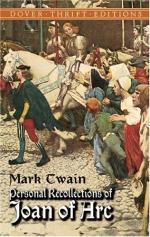The Inquisitor was right. The case as here resurrected against Joan had already been tried long ago at Poitiers, and decided in her favor. Yes, and by a higher tribunal than this one, for at the head of it was an Archbishop—he of Rheims—Cauchon’s own metropolitan. So here, you see, a lower court was impudently preparing to try and redecide a cause which had already been decided by its superior, a court of higher authority. Imagine it! No, the case could not properly be tried again. Cauchon could not properly preside in this new court, for more than one reason:
Rouen was not in his diocese; Joan had not been arrested in her domicile, which was still Domremy; and finally this proposed judge was the prisoner’s outspoken enemy, and therefore he was incompetent to try her. Yet all these large difficulties were gotten rid of. The territorial Chapter of Rouen finally granted territorial letters to Cauchon—though only after a struggle and under compulsion. Force was also applied to the Inquisitor, and he was obliged to submit.
So then, the little English King, by his representative, formally delivered Joan into the hands of the court, but with this reservation: if the court failed to condemn her, he was to have her back again! Ah, dear, what chance was there for that forsaken and friendless child? Friendless, indeed—it is the right word. For she was in a black dungeon, with half a dozen brutal common soldiers keeping guard night and day in the room where her cage was—for she was in a cage; an iron cage, and chained to her bed by neck and hands and feet. Never a person near her whom she had ever seen before; never a woman at all. Yes, this was, indeed, friendlessness.
Now it was a vassal of Jean de Luxembourg who captured Joan and Compiegne, and it was Jean who sold her to the Duke of Burgundy. Yet this very De Luxembourg was shameless enough to go and show his face to Joan in her cage. He came with two English earls, Warwick and Stafford. He was a poor reptile. He told her he would get her set free if she would promise not to fight the English any more. She had been in that cage a long time now, but not long enough to break her spirit. She retorted scornfully:
“Name of God, you but mock me. I know that you have neither the power nor the will to do it.”
He insisted. Then the pride and dignity of the soldier rose in Joan, and she lifted her chained hands and let them fall with a clash, saying:
“See these! They know more than you, an can prophesy better. I know that the English are going to kill me, for they think that when I am dead they can get the Kingdom of France. It is not so.
“Though there were a hundred thousand of them they would never get it.”
This defiance infuriated Stafford, and he—now think of it—he a free, strong man, she a chained and helpless girl—he drew his dagger and flung himself at her to stab her. But Warwick seized him and held him back. Warwick was wise. Take her life in that way? Send her to Heaven stainless and undisgraced? It would make her the idol of France, and the whole nation would rise and march to victory and emancipation under the inspiration of her spirit. No, she must be saved for another fate than that.




